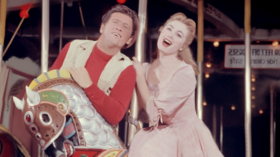The rewriting of Carousel is the latest front in a war being waged by identity-obsessed philistines against Western art & culture

The woke cultural jihad has gained unprecedented momentum in recent years, with the likes of Rodgers and Hammerstein, Chaucer, Shakespeare, and Beethoven all condemned and chastised for the original sin of ‘whiteness’.
As far as our new cultural commissars are concerned, classical musical and theatre productions must be either rewritten to reflect their worldview or, alternatively, cancelled. That is why a new production of the musical ‘Carousel’ has a fundamentally different ending from the original version.
In the original ‘Carousel’, the brutal wife-beater Billy takes his own life. He eventually returns to Earth in order to help his daughter Louise make her way in the world. Because of his actions, Billy finds redemption, gains forgiveness, and ends up in heaven.
But in the era of the #MeToo movement there can be no redemption for a brute like Billy. That is why in the new production, there is no place for Billy, nor for his tale of absolution. Instead, in the final scene it is the local matriarch – no doubt the head of the local #MeToo chapter – who takes Louise’s hand to guide her towards salvation.
Meddling with classical literature and art has now turned into a veritable cultural industry. Modern ballet has become enveloped in claims and counterclaims that many of its great classics are racist. ‘The Nutcracker’ has been targeted on the grounds that its choreography and costumes are traditionally used to reinforce stereotypes and are therefore demeaning and offensive to Chinese people. There are numerous calls to ‘reimagine’ ‘The Nutcracker’ and to rid it of its supposed “shameful display of racist cultural appropriation.”
The Paris Opera, one of the most revered art institutions in the world, has decided to join the crusade and rid ballet of racist stereotypes. Earlier this year, it published a 66-page report on its commitment to promote diversity in its ballet. Its artistic director Alexander Neef stated that action would be taken to deal with racist caricatures in classic ballet productions.
Historically, ballet dancers have frequently applied white body paint in productions such as ‘Giselles’ or ‘Les Sylphides’ in order to highlight a supernatural atmosphere. Now, these attempts to create a supernatural, ghostly impression are often condemned as examples of white supremacy. How long before the association of the white swan in ‘Swan Lake’ with goodness is ‘reimagined’ and performed in a different colour?
In recent years, cultural crusaders have demonstrated an intense hostility towards classical music. Their hatred for this art form is not surprising, since classical music is as Western as it gets. This sentiment was forcefully communicated back in 2019 by Philip Ewell, a black music-theory professor, during his talk at the Society for Music Theory in Columbus, Ohio. Ewell argued that classical music is compromised by its whiteness.
For Ewell, white supremacy is evident in the teaching, playing, and interpretation of classical music. From this perspective, where everything is seen to involve white racism, all the values celebrated in classical music are expressions of whiteness; they are all coded in a “white racial frame,” says Ewell. So, the reason Beethoven enjoys such high esteem among lovers of classical music is not because of his genius, but because, as Ewell explains, he “has been propped up by whiteness and maleness for 200 years.”
Predictably, the classical music establishment has rolled over and embraced the criticism that it is irredeemably compromised by association with white supremacy, and flagellated itself accordingly. At times, the classical music press appears to portray a love of this art form as a marker of white supremacy. Last September, the “white American” critic Alex Ross cravenly wrote about a world that is “blindingly white, both in its history and its present.” As far as Ross is concerned, classical music must acknowledge its “history of systemic racism.”
Since it is difficult to rewrite classical music, opponents of Western culture are forced to confine their objective to a demand that the number of black performers in concert halls should be dramatically increased.
In many ways, the most insidious dimension of the culture war waged against the classical legacy in the West is its attempt to cancel and render invisible some of the most important contributions to the literary canon.
Take the campaign to remove Geoffrey Chaucer from the university curriculum, for example. Chaucer, who is arguably the father of English poetry, has been denounced by his detractors as a rapist, racist, and an anti-Semite. That is why, in January, the University of Leicester announced that it would remove Chaucer from the English curriculum. Along with other problematic poets, he is to be replaced with courses on “race, ethnicity, sexuality and diversity.”
If they can ditch Chaucer, is it any surprise that they are coming for Shakespeare? A growing number of teachers in the United States have declared that they are not prepared to teach Shakespeare on the grounds that his works promote “misogyny, racism, homophobia, classism and anti-Semitism.”
These illiterate philistines informed the School Library Journal that they were ditching plays like ‘Hamlet’, ‘Macbeth’, and ‘Romeo and Juliet’ in order to “make room for modern, diverse, and inclusive voices.” At least they are not following the example of the producers of ‘Carousel’ and bastardising these plays to make them acceptable to their woke sensibilities.
Also on rt.com ‘Anne Boleyn’ is so dull that the lead’s race is the only thing worth discussing… as intendedThe hatred directed at classical music, art, and literature is not unlike the sentiment that drove radical Islamists to destroy ancient temples, statues, and works of art in Afghanistan, Syria, and Iraq. Like the woke enemies of Western civilisation, the Islamists possess an attitude of unrestrained hatred towards any cultural heritage that stands for beliefs and values alien to their dogmatic and philistine world view.
Many readers probably imagine that it is wrong to compare the act of changing the ending of ‘Carousel’ or the cancelling of Chaucer with the destructive behaviour of the Taliban or ISIS. Though cancel culture has not unleashed the kind of violent behaviour demonstrated by jihadi maniacs, they too are in the business of attempting to undermine and rid the world of a cultural tradition they despise. What is at issue is not the fate of a musical, but of the maintenance of the integrity of civilisational accomplishments that enrich our lives.
We must stand up for the classics and reject these attempts to besmirch their reputation from people for whom the arts are nothing but a political battleground. Those who would deprive people of the experience of being exposed to the classics will not stop at merely cancelling art. Should they prevail in this conflict over cultural values, they will move on to target other dimensions of public life – particularly the freedoms that we still enjoy.
Like this story? Share it with a friend!
The statements, views and opinions expressed in this column are solely those of the author and do not necessarily represent those of RT.















